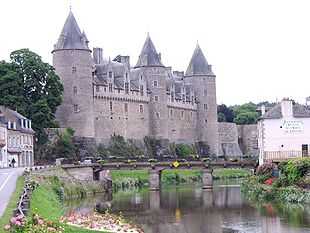Porhoët
The noble Breton family line of Porhoët is represented in modern times by the Franco-Breton House of Rohan.
History

The first recognised vicomte de Porhoet was Guithenoc (abt. 990-1040CE), was born in Guilliers. He married Allurum (994-?) of Guilliers. He became Vicomte, and in about 1008 he moved to La Trinite, in Porhoet. Both Guilliers and Porhoet are located in the modern day French departement of Morbihan in the province of Brittany.
In Porhoët Guithenoc built Josselin Castle, which he named for his son, Josselin (1020–1074). It is still owned by the descendents of Porhoet and is the longest continuously held private estate in the world.
Vicomte Josselin de Porhoet had three sons with the surname Rohan: Mainguy De Rohan, Jostho de Rohan, and Roger de Rohan. He had a fourth son, the third vicomte de Porhoet, Eudo I de Porhoet (1049-?).
Eudo (or Eudes) I married Anne de Leon (1065-?). They had two children, Vicomte Geoffrey de Porhoet (1092–1141) and Alain I de Rohan
Geoffrey is said to have married Hawisa Fergant of Brittany (abt. 1105-?). They had two sons, one of which was as Odo II or Odo, Viscount of Porhoet (1122-?).
The title Count of Porhoet was joined to the breton Ducal crown. Pierre Mauclerc bestowed the title on his daughter Yolande; upon her death the title was rejoined to the Duchy by her brother John I.
Franco-Breton House of Rohan
Alain le Noir was the 1st Viscount de Rohan. He was the third son of Eudes I de Porhoet and his wife Emma de Léon (the daughter of Guyomarch II, Viscount de Léon). The name Rohan comes from the name of the castle he built, and passed on to his descendants, on the shores of the Oust.
His son, Eudes II, married Bertha, the daughter of Conan III and Maud of England (an illegitimate daughter of Henry I). They had no descendants.
Viscount of Porhoet as Duke of Brittany
Eudes II of Porhoet, known also as Odo II is a notable figure in the history of the Duchy of Brittany.
Odo II married into the ruling duchy of Brittany though his first marriage to Bertha (b.1114-?). This was Bertha's second marriage. She was the daughter of Conan III, Duke of Brittany. Upon Bertha's death, Odo II served as Regent to Bertha's son Conan IV of Penthièvre. Bertha and Odo II had three children permitting the Porhoet line to continue.
Bertha's sister Constance (1118-?) was next in line to the duchy (after Bertha); she married Alan, younger brother to Odo II, thus cementing Porhoet claims to Brittany.
When Bertha died, Odo II tried to deny Conan IV his inheritance and usurp the rule of Brittany. He formed an alliance with Hoel, Count of Nantes, Conan III's disinherited son.[lower-alpha 1] In order to counter Odo II, Henry II of England invaded Brittany. [lower-alpha 2] In 1516 Odo was deposed by his step son and imprisoned by Conan IV's ally Raoul de Fougeres. Henry II raised Josselin Castle.
Odo II possibly had a second marriage with Jeanne/Eléonore de Léon, daughter of Guiomar III, Vicomte de Léon. They had two, and possibly three, children.
The Vicomtes and Counts of Porhoët
- Guithenoc (990 - 1040) - becomes Vicomte;
- Josselin - Vicomte de Porhoet - son of Vicomte Guithenoc
- Odo[lower-alpha 3] I, Vicomte de Porhoët- son of Vicomte Josselin
- Geoffrey, Victome de Porhoët - son of Odo I, married Hawise Fergant of Brittany
- Odo II - husband of Bertha and so son-in-law of Conan III, Duke of Brittany; contested the Ducal Crown of Brittany
- Odo III, Comte de Porhoët - son of Odo II
- Yolande de Dreux (1218-1272), Comtesse de Porhoët [lower-alpha 4]
- Alan, [lower-alpha 5] - son of Odo III; flees to England
- Odo III, Comte de Porhoët - son of Odo II
- Alan de Porhoët - younger brother of Odo II, husband to Constance of Brittany, the younger sister of Bertha
- Odo II - husband of Bertha and so son-in-law of Conan III, Duke of Brittany; contested the Ducal Crown of Brittany
- Alan - Vicomte de Rohan; son of Odo I and founder of the House of Rohan
- Geoffrey, Victome de Porhoët - son of Odo I, married Hawise Fergant of Brittany
- Odo[lower-alpha 3] I, Vicomte de Porhoët- son of Vicomte Josselin
- Josselin - Vicomte de Porhoet - son of Vicomte Guithenoc
Notes
- ↑ In order to consolidate his power, King Henry II of England (5 March 1133- 6 July 1189) had planned to replace Duke Conan III of Brittany with someone from his immediate family. He had promised his younger brother Geoffrey, of the house of Plantegenet, this duchy if he succeeded to the throne of England. To this end, he had Conan III disinherit his son Hoel III, claiming him as illegitimate. (Hoel III's mother, the Duchess, Maude, was an illegitimate daughter to Henry I of England). This meant that Bertha, who was the next in line to the duchy of Brittany, became the legitimate heir to the estate of Conan III.
- ↑ Henry II faced anarchy on many fronts; he was in the midst of the "Nineteen Year Winter." His younger brother Geoffrey, to whom he had promised the duchy, also contested the throne. As a result of the invasion of Brittany, the Porhoet family eventually recognised Henry II as King.
- ↑ Odo, in French, is Eudes.
- ↑ Countess of Porhoët suo jure; her father was Pierre Mauclerc
- ↑ In an earlier edition of this article he is listed as the 1st Baron Zouche. This claim is under review.
External links
- http://web.archive.org/web/20070814061819/http://www.peterjoslin.btinternet.co.uk/chateau_josselin.htm
- http://www.casteland.com/puk/castle/bretagne/morbihan/josselin/josselin.htm